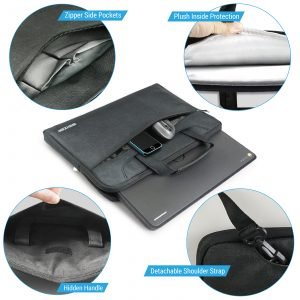As Chromebooks become increasingly popular for both students and professionals, choosing the right case to protect your device is essential. With a variety of materials available on the market, each offering different levels of protection, it can be challenging to decide which case is best for your needs. In this blog, we’ll explore the most common materials used in Chromebook cases and analyze their protective qualities.
1. Hard Shell Cases

Material: Polycarbonate or ABS Plastic
Protection Analysis: Hard shell cases are designed to provide solid protection against drops and impacts. Made from durable polycarbonate or ABS plastic, these cases often feature a lightweight yet robust design. They effectively shield your Chromebook from scratches and minor bumps, making them ideal for everyday use.
Pros:
- Excellent impact resistance
- Lightweight and portable
- Sleek appearance
2. Soft Shell Cases

Material: Silicone or Neoprene
Protection Analysis: Soft shell cases, often made from silicone or neoprene, offer flexibility and a snug fit. While they provide a softer layer of protection, they are particularly effective at absorbing shock during falls, making them a good choice for users on the go.
Pros:
- Great shock absorption
- Soft-touch feel and flexibility
- Lightweight and easy to carry
Cons:
- Less rigid structure may not prevent serious impacts
- Prone to wear and tear over time
3. Rugged Cases

Material: TPU (Thermoplastic Polyurethane) or Multi-layered Composites
Protection Analysis: For those seeking maximum protection, rugged cases are the way to go. Often constructed from TPU or multi-layered composites, these cases are designed to withstand extreme conditions. They provide exceptional drop protection and are often tested to meet military-grade standards.
Pros:
- Superior drop protection
- Highly durable materials
- Often includes features like built-in screen protectors
Cons:
- Bulkier and heavier
- May not fit in standard backpacks easily
4. Sleeves and Pouches

Material: Fabric or Neoprene
Protection Analysis: While sleeves and pouches may not offer hard protection, they are perfect for users who need a lightweight option. Made from fabric or neoprene, these cases provide basic protection against scratches and minor impacts during transport.
Pros:
- Lightweight and portable
- Ideal for travel
- Variety of designs and colors
Cons:
- Minimal impact protection
- Not suitable for daily rugged use
5. Convertible Cases
Material: Multi-material combinations (e.g., Polycarbonate with Fabric)
Protection Analysis: Convertible cases combine multiple materials to offer versatility and protection. These cases often transform into stands and include fabric for added aesthetics while maintaining a hard shell for durability.
Pros:
- Multi-functional design
- Stylish appearance
- Good balance between protection and usability
Cons:
- May not provide as much protection as rugged cases
- Heavier than standard cases
Conclusion
Choosing the right Chromebook case involves understanding the material and the level of protection it offers. Whether you prioritize durability, portability, or style, there’s a case out there that fits your needs. Consider your daily usage and environment when making your choice, and invest in a case that will keep your Chromebook safe and secure for years to come. Happy shopping!












